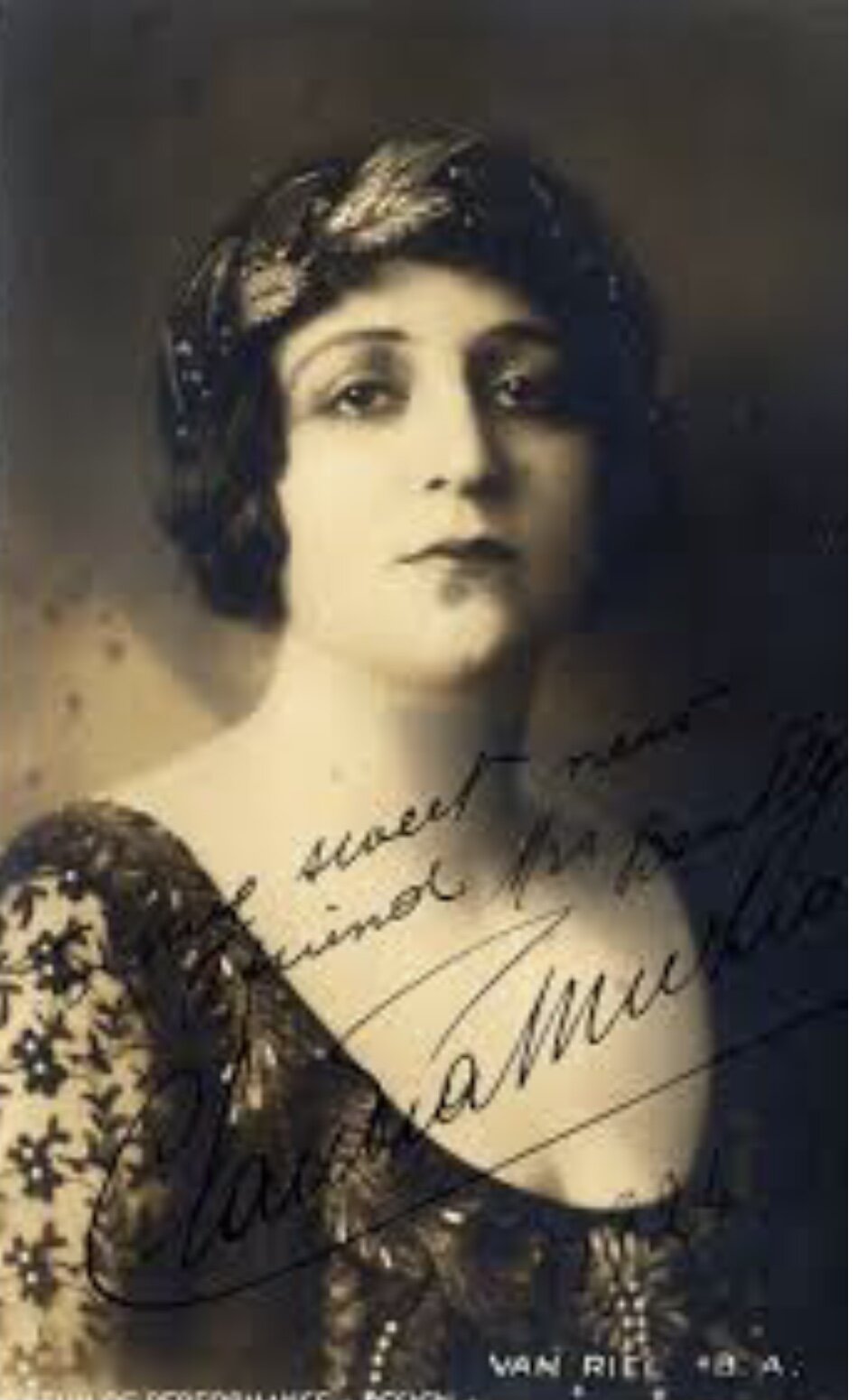Claudia Muzio: Advent Calendar of Song: Day Twenty
Advent Calendar of Song: Day Twenty
There are six remaining days of Advent. Of course I could fill them with six unexceptionable and lovely numbers that would please you all. There have been days this Advent when indeed my choice seems to have found universal favour. Maybe today’s choice will please everyone, too: she’s wonderful. Still, I hope you can spot her imperfections: they’re pretty well part and parcel of her essence, of her art.
This is Claudia Muzio (1889-1936), who is often held up beside Rosa Ponselle and Maria Callas as one of the three topmost acting/dramatic sopranos of the twentieth century. She shared with those two women a number of roles, such as Leonora in Il Trovatore, Violetta in La Traviata, the title role of Aida, Leonora in La Forza del destino, and the title roles of Tosca. She sang with Caruso; she appeared at La Scala, the Paris Opera, Covent Garden, and the New York Metropolitan. For Puccini, she created the role of Giorgetta in Il Tabarro,the first of his Trittico (Triptych) operas that had their world premieres at the New York Met in 1918.
But, probably because of Ponselle among others, Muzio did not remain a regular at the Met. The cities of her greatest triumphs were Chicago and Buenos Aires, to both of which she kept returning. I’ve read that she was unlucky in love and money; I know too little about these, but she died of heart failure in a Rome hotel bedroom after a short illness at age forty-seven. The most famous of her recordings were ones she had paid to have made, the year before her death.
Muzio may have been the most marvellous of verismo sopranos, the most touching of the generation whose voices vibrated intensely in their pursuit of emotional realism. Her vocal emission is nothing as smooth as Ponselle’s - it’s often bumpier and more tremulous than Callas’s - but her voice has a fabulous interplay of bloom and shadow, of feeling and utterance, doom, suffering, love, and hope. You can find a vivid live 1932 San Francisco recording of Act One of Tosca on YouTube where she - unlike Callas in the same role - is none too scrupulous with musical markings, but where her voice, with its mingled qualities of bloom and shadow, is marvellously affecting. Like a number of verismo singers, her diction has its affectations (mannered vowels, in particular) - but you can hear a remarkably high number of the words, all of them individually inflected; and she can move from extrovert to introvert within a single phrase.
I ought to choose her in one of her theatrical roles. But she recorded songs as well as opera; and I love the way that she can express things beyond her own emotions, the way that she can show you the world she’s looking at as well as the operation of her own heart or neurosis. Debussy’s beautifully bittersweet “Beau soir” (1880, revised in 1890-1891, with words by Paul Bourget) has been sung in purer French and with finer line than here; and perhaps her manner is altogether too tragedy-queen for it. https://www.youtube.com/watch?v=u-FHtncqMO0 The first four words, “Lorsqu’ au soleil couchant” show the peculiarly exaggerated vowels and unsteady tone of her singing - and yet they seize me, tighten my own heart. I see the landscape, the light, and I see them through her eyes.
By the time we’ve reached the third line - “Un conseil d’être heureux semble sortir des choses” (“An advice to be happy seems to come out from things”), we’re deep in the complexity of Muzio-ness: she releases the word “heureux” (“happy”) with a jerk as if she meant the complete opposite. That, you now realize, is because the words move on: she now speaks of “le coeur troublé”, “the troubled heart”. And her chest register catches the word “coeur” with a marvellous dash of pain - but then her middle register gathers the word “troublé” up into herself as if nursing it privately, intimately.
Lorsque au soleil couchant les rivières sont roses
Et qu'un tiède frisson court sur les champs de blé,
Un conseil d'être heureux semble sortir des choses
Et monter vers le coeur trouble:
When in the setting sun the rivers are pink
and a warm breeze ripples the fields of wheat,
advice to be happy seems to emerge from all things
and to rise toward the troubled heart:
un conseil de goûter le charme d'être au monde
cependant qu'on est jeune et que le soir est beau,
car nous nous en allons, comme s'en va cette onde:
elle à la mer, nous au tombeau.
advice to taste the enchantment of being in the world,
while we are young and while the evening's beautiful,
for we depart, as does that river:
it to the sea - we to the tomb.
In the second stanza she covers so much ground – in the opening line alone. The placing of her voice makes so much from the chest register in “un conseil” before passing up to the highly charged urgency of “de goûter le charme d’être au monde”. Then the next line (marked by Debussy “animato poco a pco e crescendo” till it reaches forte on the word “beau”) goes lower and higher: “qu’on est jeune” (“while we’re young”) has something like despair, and “que le soir est beau” has – what? – a completide plenitude of feeling: a painful anguish that then melts and shines on the long word “beau.” That’s the line that gives the song its title; and really it’s the climax. But it’s the final two lines, marked by Debussy with diminuendi until they reach p and pp, that explain everything that’s gone before: the inevitability of nature and death. Of course Muzio should not pause to take a breath before the final word “tombeau”! And yet she colours it with such inwardness that she makes it surprising - or rather she surprises us with its soft, tender, vibrancy. Everything has been leading to this word “tombeau”; but you could write pages about the thought within it, because death, the tomb, is not really what she’s speaking of. The river is flowing into the sea; we, departing into death, are entering something far larger than ourselves. Whether or not we find Muzio tragic, now she transcends tragedy. This is a philosophical song; there are singers who would map out its philosophy for us, didactically. Not Muzio: she sings the song as if she's driven at every moment, as if her thought in every moment is new to her. I've lived with this recording for over thirty-five years, never listening to it without a big spectrum of emotion.




